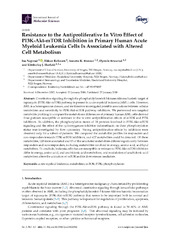| dc.contributor.author | Nepstad, Ina | en_US |
| dc.contributor.author | Reikvam, Håkon | en_US |
| dc.contributor.author | Brenner, Annette | en_US |
| dc.contributor.author | Bruserud, Øystein | en_US |
| dc.contributor.author | Hatfield, Kimberley Joanne | en_US |
| dc.date.accessioned | 2019-05-29T09:05:09Z | |
| dc.date.available | 2019-05-29T09:05:09Z | |
| dc.date.issued | 2018-01-27 | |
| dc.Published | Nepstad I, Reikvam H, Brenner AK, Bruserud Ø, Hatfield KJ. Resistance to the antiproliferative in vitro effect of PI3K-Akt-mTOR inhibition in primary human acute myeloid leukemia cells is associated with altered cell metabolism. International Journal of Molecular Sciences. 2018;19(2):382 | eng |
| dc.identifier.issn | 1422-0067 | |
| dc.identifier.uri | https://hdl.handle.net/1956/19799 | |
| dc.description.abstract | Constitutive signaling through the phosphatidylinositol-3-kinase-Akt-mechanistic target of rapamycin (PI3K-Akt-mTOR) pathway is present in acute myeloid leukemia (AML) cells. However, AML is a heterogeneous disease, and we therefore investigated possible associations between cellular metabolism and sensitivity to PI3K-Akt-mTOR pathway inhibitors. We performed non-targeted metabolite profiling to compare the metabolome differences of primary human AML cells derived from patients susceptible or resistant to the in vitro antiproliferative effects of mTOR and PI3K inhibitors. In addition, the phosphorylation status of 18 proteins involved in PI3K-Akt-mTOR signaling and the effect of the cyclooxygenase inhibitor indomethacin on their phosphorylation status was investigated by flow cytometry. Strong antiproliferative effects by inhibitors were observed only for a subset of patients. We compared the metabolite profiles for responders and non-responders towards PI3K-mTOR inhibitors, and 627 metabolites could be detected. Of these metabolites, 128 were annotated and 15 of the annotated metabolites differed significantly between responders and non-responders, including metabolites involved in energy, amino acid, and lipid metabolism. To conclude, leukemia cells that are susceptible or resistant to PI3K-Akt-mTOR inhibitors differ in energy, amino acid, and arachidonic acid metabolism, and modulation of arachidonic acid metabolism alters the activation of mTOR and its downstream mediators. | en_US |
| dc.language.iso | eng | eng |
| dc.publisher | MDPI | eng |
| dc.rights | Attribution CC BY | eng |
| dc.rights.uri | http://creativecommons.org/licenses/by/4.0 | eng |
| dc.subject | Acute myeloid leukemia | eng |
| dc.subject | metabolism | eng |
| dc.subject | mTOR | eng |
| dc.subject | PI3K | eng |
| dc.subject | phosphorylation | eng |
| dc.title | Resistance to the antiproliferative in vitro effect of PI3K-Akt-mTOR inhibition in primary human acute myeloid leukemia cells is associated with altered cell metabolism | en_US |
| dc.type | Peer reviewed | |
| dc.type | Journal article | |
| dc.date.updated | 2019-01-24T10:37:16Z | |
| dc.description.version | publishedVersion | en_US |
| dc.rights.holder | Copyright 2018 The Author(s) | |
| dc.identifier.doi | https://doi.org/10.3390/ijms19020382 | |
| dc.identifier.cristin | 1554166 | |
| dc.source.journal | International Journal of Molecular Sciences | |

